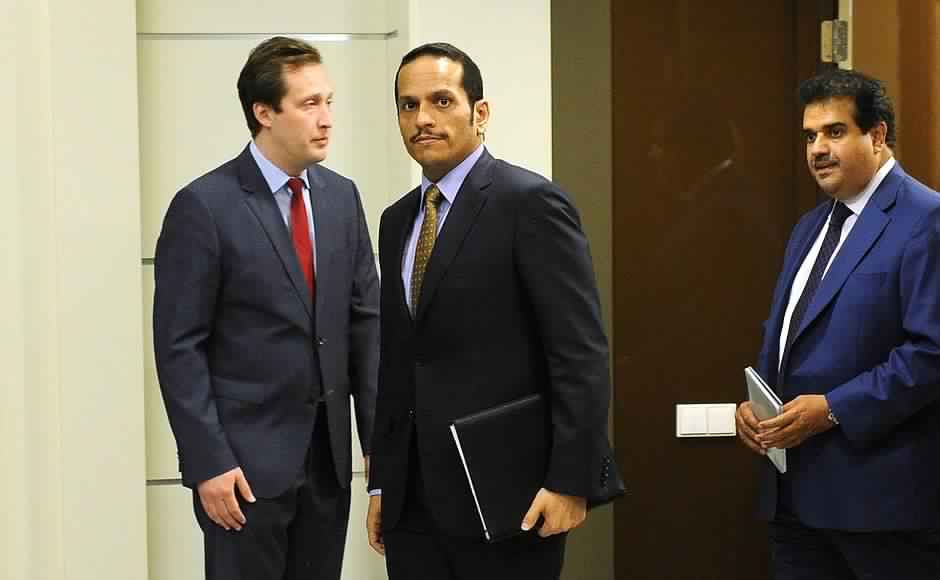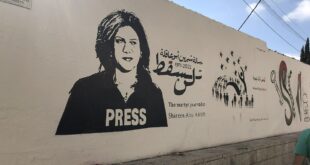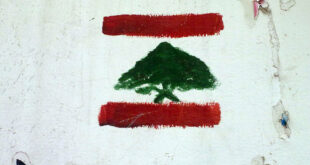Tensions between Qatar and the rest of the Gulf Cooperation Council and other Arab countries resurfaced with a vengeance in May 2017. The latest escalation came in response to statements allegedly made by Emir Sheikh Tamim bin Hamad Al Thani in support of Iran as the region's power broker, and Hamas as the legitimate representative of the Palestinian people appeared in the country's press. The Qatari government quickly denied the Emir’s statements, claiming that its media had been hacked with false news reports.
But its efforts to contain the regional firestorm failed as within a week Bahrain, Egypt, Libya, Saudi Arabia, UAE, and Yemen all announced that they had severed ties with Qatar and ordered diplomatic staff to leave within 48 hours. The six countries claimed that Qatar had links with terrorist groups in the region.
This is not the first time that Qatar has found itself at loggerheads with rest of the Arab nation.
In February 2014, fiery Islamic cleric Yusuf Al Qaradawi, a staple of Al Jazeera's Arabic programming, launched a verbal attack on the United Arab Emirates and other Arab countries for supporting the Egyptian government following the ouster of Muslim Brotherhood (MB) president Mohamed Morsi. His sermon created a diplomatic spat with the UAE that would get worse within a few months and repeat itself in cycles over the coming years.
The Brotherhood factor
Following the removal of Egyptian President Hosni Mubarak in 2011, Qatar backed the Muslim Brotherhood and Islamist factions in Egypt. In 2012, the black flags of Al-Qaeda were widely seen in Tahrir Square. Al Qaradawi, who has backed Al Qaeda and refused to condemn suicide bombers in Iraq and Palestine, gave a speech in the square in 2012.
Qatar dedicated Al Jazeera to the service of the Muslim Brotherhood and turned it into what prominent Middle East scholar Alain Gresh calls a “mouthpiece for the Brotherhood.” Al Jazeera Masr hosted dozens of pro-MB guests.
After Morsi was removed in Egypt, Al Jazeera continued to support the MB despite the advice and objections of many of its allies in the Gulf Cooperation Council. Saudi Arabia and the UAE, the latter having come under direct threat in some senior MB speeches in 2012 and 2013, urged Qatar to back away from supporting the organization.
By 2014, Saudi Arabia, the UAE, and Bahrain withdrew their ambassadors from Doha after Qatar failed to honor a joint security agreement in November 2013 that included commitments to cease support for the Muslim Brotherhood and its hosting of Gulf opposition figures. This was unprecedented among the usually unified and resolute GCC and marked a shift in Qatar's fortunes. How could it influence the region like it once did if it was becoming a pariah among its closest friends and allies?
So much has the rift grown that even the emirate’s most stalwart friends appear to have turned on it and are planning its demise. In early June, the Huffington Post published a series of emails from UAE ambassador Yussuf Otaiba to senior US officials urging them to withdraw US military bases from Qatar.
But the story of Qatar's media wars with its neighbors (and as far away as the Arab Maghreb) didn’t begin in the past decade but lie in the roots of Al Jazeera’s founding in 1996, and span four political and diplomatic eras since then.
Four Eras
The first era begins in 1971 with its independence from being a British protectorate and spans until 1996—a rather inconsequential era that had little bearing on the region. The second can be identified as the Al Jazeera era, which spans from 1996 to 2010. The third era is that associated with the Arab Spring, which began in 2010 and lasted through 2015. And the fourth is from 2015 to the present. Throughout, these four eras have been characterized by two main themes: Firstly, Qatar’s Wahabist nature, likely the predominant factor and what lies at the heart of what the populace wants in terms of foreign policy. The second is Qatar's vulnerability. Qatari foreign policy has long been determined by its vulnerability to Saudi Arabia's appetite for religious expansionism and territorial hegemony.
A Soft Coup
Until 1995, Qatar was a non-player. An insignificant yet wealthy mostly Sunni Arab nation straddling the Persian Gulf like a sore thumb sitting on a seemingly endless supply of natural gas. A member of the Gulf Cooperation Council since its inception, Qatar in the 1990s lacked the economic dynamo that molded the United Arab Emirates into a global business player, the bravado of the Kuwaitis, and the openness of the Bahrainis. In almost all regional affairs, it allowed Saudi Arabia to determine its foreign policy.
All that, of course, changed in 1995 when Sheikh Hamad bin Khalifa al Thani overthrew his father while he was on a state trip abroad, and seized control of the country. The father failed to mount a counter-coup because his assets were seized. He lived a lavish lifestyle in Abu Dhabi until he was "pardoned" and allowed to return to Qatar in 2004. The non-violent palace coup was a turning point in Qatari history.
A senior Qatari official who was the editor of one of the country's state-owned dailies told me in confidence that while the father was a stringent Wahabi along the likes of the Saudis, the junior al Thani was not.
Educated at Sandhurst College in the UK—like most Arab royalty—he had more worldly outlook. He saw the UAE, then an ally and friend, as a role model. Still, he was wary of the rampant Westernization that at one point could be used to describe Abu Dhabi's drive toward modernity.
For the first time in Gulf history, the wife of an Emir was allowed a very visible and public profile. Sheikha Moza bint Nasser established the Qatar Foundation, which oversaw research and development projects throughout the country and today is a major force in the country's education. When abroad, she did not wear the niqab or veil, but dressed modestly. Her daughter too was active and outspoken, and soon became a diplomat extraordinaire for the emir on trips abroad.
The emir sought to move Qatar forward as a modernized, educated, and established member of the international community. With no real army to speak of and surrounded by potentially hostile countries like Saudi Arabia and Iran, the emir had to make a difficult choice. How to move Qatar forward from under Saudi clutches without losing sovereignty and independence?
In the post-1991 Iraq war period, the US military was based in Saudi Arabia. The Clinton administration's foreign policy at the time was based on dual containment of Iraq and Iran. In 1996, 19 US airmen were killed in a terrorist attack at Khobar Towers in Saudi Arabia. US presence in Saudi Arabia was fueling much resentment on the Arabian Peninsula and enflaming bin Laden's crusade in the region.
The US was looking for a more amenable and hospital base along the Persian Gulf. To offset Saudi Arabia, Hamad initiated talks with Washington to bring US military advisors to Qatar. The process would be completed by September 2002 when Centcom in its entirety would move from Florida to Doha, the capital, just down the street from Al Jazeera.
Malignant media
In 1996, the BBC sought to establish a new Arabic-language network based in Saudi Arabia. For one reason or another, the initiative failed and the Qataris, who had by now realized that their survival depended on soft power, lured the BBC executives to Doha, throwing hundreds of millions of dollars into the fledgling Al Jazeera.
From almost the beginning, Al Jazeera began to create ripples of angst and dissent in the region: A 24-hour news network helmed by professionals well-established from their days at the BBC providing cutting-edge, brazen, and challenging reporting. The Arab World was not ready for this type of news making, which on the surface appeared balanced and provocative. Soon, Al Jazeera offices were shut in Kuwait, Tunisia, Egypt, and elsewhere.
Al Jazeera's reporting was not only challenging the existing mindset (reporting live from Israel and interviewing Israeli officials, showing the Israeli side of the conflict) but also challenging the existing ironclad hold of dictatorial regimes on their peoples. The revolutions, rebellions, and recriminations that we have experienced in the past few years likely could not have come about had it not been for Al Jazeera Arabic's reporting.
The network itself became a socio-political coup that reverberated throughout the region. It would form the crux of Qatar's foreign policy in the MENA region, and its attempts to curry favor in Washington. Between 1996 and 2003, Qatar's financial focus was directed toward setting up a news channel that would, between the lines, deliver the state's foreign policy to millions of homes in the region and beyond.
It was an unprecedented endeavor. The Arab peoples had never seen or heard anything like it. Panned or praised, they were drawn to it like flies to molasses. It became an addiction.
Having hired the most professional of Arab journalists and media experts, Al Jazeera was becoming the de facto voice of the Qatari government. Arab governments would file complaints with the Qatari foreign ministry—as we saw in the case of the UAE—when an Al Jazeera report would appear overtly critical or demeaning. At the same time social media was becoming the tool used by dissidents to empower their once voiceless struggles.
It could be argued that there was a two-pronged approach, dissidents and exiled opposition were using the Internet to reach out to a public that was just awakening to freedom of expression, and were simultaneously being given air time on Al Jazeera.
By 2005, after the assassination of Lebanese premier Rafiq Al Hariri, this came to a boil. Anti-Syrian forces came out en masse and their struggle was given primetime coverage on Al Jazeera. Day and night, the anti-Syrian protesters, and their contempt for the Assad regime, were heard and seen. The Arab World had never seen such protests beamed live into their living rooms; this was an earthquake which would plant the seeds of what would happen in Tunisia, Egypt, Syria, and Bahrain six years later.
One could argue that Al Jazeera's consistent coverage of the anti-Assad protests helped push the Syrians out of Lebanon and end their more than 20-year occupation. But this was really a test run for what was to come down the line. Amid rumors that Bush and Blair had discussed bombing Al Jazeera, State Department officials were saying that Al Jazeera had done more for liberalization in the region than anyone else.
In 2006, Al Jazeera launched its English network following a soft run of an English website in 2003 to cover the Iraq war. Largely drawing from the BBC and Australia's ABC, the English network made “voice to the voiceless” its mantra and it followed through by covering Africa like no one had before.
It was an instant hit, but largely ignored in North America, which was Doha's foreign policy target all along. It believed that Al Jazeera beamed into the homes of Americans would influence Washington realpolitik in its favor. With this in mind, it hired the former head of Canada's CBC Tony Burman to lead the English network, removing it from under the thumb of Wadah Khanfar who was heading Al Jazeera Arabic.
Doha was so intent on gaining influence in the US that it threw an unprecedented two million dollars for one night of coverage of the 2008 presidential election. It was a financial throwaway for a company that was operating with a budget of $400 million a year and had limitless access to funds. Why would American audiences watch a British anchorman and anchorwoman tell them about exit polls when they had been used to watching their own traditional networks?
In the meantime, Burman enjoyed excellent relations with the American and Canadian Jewish communities and Doha hoped he could overcome their resistance to "terrorist, beheading, Al-Qaeda network Al Jazeera" as the popular impression was.
Burman was given the boot (staffing turnaround was huge and quick at Al Jazeera) after he failed to make inroads in the US. He managed to get Al Jazeera on major cable networks in Canada, but what was Canada to Qatar's world view?
So desperate were the Qataris that they bought Al Gore's unpopular Current TV network, which was not even in competition with any of the other major networks, for a hefty sum and began to air Al Jazeera America.
In the meantime, Qatar was at the forefront of Gulf Arab nations fueling the so-called Arab Spring. When Tunisia was brimming with resentment, tension and anti-government sentiment and street protests were gaining momentum, 95% of mainstream Western media had overlooked the story. But Al Jazeera owned the Tunisia story from the start, bringing the anti-government protesters much needed attention, keeping the story alive, and beaming their messages of standing up to dictatorship into the homes of other angst-ridden Arabs.
Social media and Al Jazeera: An explosive combo
Despite Egyptian authorities asserting that what happened in Tunis would not be repeated in Cairo, Egypt tipped over and again Al Jazeera was there, a camera on a central hotel beaming pictures of Tahrir Square to the world, its feed picked up by everyone.
Al Jazeera was retweeting what activists were saying, and interviewing activists and dissidents. Staff were chased down the streets. They hid under beds, on rooftops, in alleyways and sometimes the local populace helped them or ratted them out. It was Al Jazeera that reported three million people had descended on Tahrir Square, a claim which could not be disputed because no one else was covering the story.
But this is what Qatar wanted the world to know because it had long been at odds with Egypt. Having criticized Cairo for closing the Gaza border, it wanted to fill Egypt's seat as leader, arbiter, negotiator, and mediator of the region. Hosni Mubarak had already boycotted the 2009 Arab League summit in Doha because of these differences. In fact, many Arab leaders did not show up because in an unprecedented move Qatar invited Iran's former President Ahmadinejad to attend the summit.
In 2015, after allegations of Tehran’s involvement in the riots in Manama, Bahrain, Qatar decreased the level of diplomatic representation in Tehran, and recalled its ambassador. However, in stark contrast to Saudi Arabia, Bahrain, the UAE, Egypt, Sudan, Djibouti, and others, it did not close its embassy.
Qatar is an ally with the US, but has a strong relationship with Iran. It has an on and off relationship with Saudi Arabia, and commercial ties with Israel, but is a stronger backer of Hamas and other Islamist extremist groups in Gaza. These dichotomies have long left Arab strategists scratching their heads.
It is essentially on the fence with countries that are adversaries of one another. It hosted Saddam Hussein's wife and some senior Baathists while also hosting Centcom from which all major US operations in the region are planned, coordinated, and launched.
This is the epitome of its soft power. Qatar has worked to maintain a middle ground. For them, this has meant no enemies; just obstacles in their way. We see this with the case of Egypt, which was—and still is—in the way of Doha's ambitions to become regional power broker.
It uses its amassed billions to this effect and its media are the executors of this foreign policy. When, in 2008-2009, Lebanese politicians could not agree on a presidential candidate, Qatar mediated, inviting rival Lebanese factions to Doha. It was successful, not least because Qatar pledged $1 billion to the war-ravaged areas of southern Beirut and southern Lebanon which were bombed into devastation in the brief 2006 Hezbollah-Israel war. It used a very similar approach in defusing the Darfur crisis in 2010 and 2011.
Its role in Libya, Egypt, and Syria had been unmasked by the dozens of Al Jazeera staff who quit or were fired over their objections to clear bias against the governments of these countries.
But the darling of Qatar's soft power—its most effective tool—Al Jazeera has now lost its clout, its audience, and ultimately its influence. Al Jazeera America shut down in April 2016, less than three years after its launch.
Nevertheless, Qatar sees itself as a force for good. It aggressively seeks to resolve conflict and enjoys playing the role of mediator and arbiter. As the current Emir Sheikh Tamim bin Hamad Al Thani himself likes to point out, Qatar is a peace-loving member of nations that will work with the US and Western allies to bring the Middle East back from the brink of chaos and collapse. The irony is that Qatar has supported Islamist factions in Libya, in Egypt, and in Syria.
He has blamed the international community for not supporting Arab youth in their drive for democracy, justice, and economic security. That is really a scolding of the US and the West for not doing more to bring the Assad regime down.
For the immediate future, Qatar is unlikely to change course.
It took nearly a decade for Doha and Riyadh to reconcile only to have another falling out over Egypt in 2014 and again earlier this year. They may agree over Syria, but the Saudis, UAE, and Kuwait were furious that Mubarak had been ousted, something prodded on by Al Jazeera. Now they want Qatar to back off its hostility toward the government of Abdel Fatah El Sisi.
Qatar has repeatedly miscalculated; it has lost leverage, and it must carefully chart a way back to international trustworthiness.
 Arab Media & Society The Arab Media Hub
Arab Media & Society The Arab Media Hub





